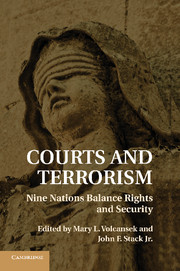Book contents
- Frontmatter
- Contents
- Contributors
- COURTS AND TERRORISM
- Introduction
- 1 Detentions and Security versus Liberty in Times of National Emergency
- 2 One More Casualty of the “War on Terror”
- 3 State Secrets and Democratic Values
- 4 What Lessons Can Be Drawn from a Sui Generis Case? The Global “War on Terror” and Northern Ireland
- 5 The British Experience with Terrorism: From the IRA to Al Qaeda
- 6 Detention and Treatment of Suspected Terrorists under the European Convention on Human Rights
- 7 Australia's Commonwealth Model and Terrorism
- 8 Judicial Rejection as Substantial Relief: The Israeli Supreme Court and the “War on Terror”
- 9 Preserving Rights and Protecting the Public: The Italian Experience
- 10 Squaring the Circle? Fighting Terror while Consolidating Democracy in Spain
- 11 From Exception to Normalcy: Law, the Judiciary, Civil Rights, and Terrorism in Colombia, 1984–2004
- Conclusion: Lessons Learned
- Cases Cited
- Statutes Cited
- References
- Index
2 - One More Casualty of the “War on Terror”
Published online by Cambridge University Press: 05 July 2011
- Frontmatter
- Contents
- Contributors
- COURTS AND TERRORISM
- Introduction
- 1 Detentions and Security versus Liberty in Times of National Emergency
- 2 One More Casualty of the “War on Terror”
- 3 State Secrets and Democratic Values
- 4 What Lessons Can Be Drawn from a Sui Generis Case? The Global “War on Terror” and Northern Ireland
- 5 The British Experience with Terrorism: From the IRA to Al Qaeda
- 6 Detention and Treatment of Suspected Terrorists under the European Convention on Human Rights
- 7 Australia's Commonwealth Model and Terrorism
- 8 Judicial Rejection as Substantial Relief: The Israeli Supreme Court and the “War on Terror”
- 9 Preserving Rights and Protecting the Public: The Italian Experience
- 10 Squaring the Circle? Fighting Terror while Consolidating Democracy in Spain
- 11 From Exception to Normalcy: Law, the Judiciary, Civil Rights, and Terrorism in Colombia, 1984–2004
- Conclusion: Lessons Learned
- Cases Cited
- Statutes Cited
- References
- Index
Summary
The U.S. “War on Terror” has produced a little discussed but very important casualty: the international reputation of U.S. Supreme Court jurisprudence. Today, many scholars both within the United States and abroad note the dwindling influence of the U.S. Supreme Court. For example, on September 17, 2008, the front page of the New York Times declared, “U.S. Court Is Now Guiding Fewer Nations.” The article observed that in recent years, citations to the Canadian Supreme Court and European Court of Justice have been on an upswing, especially in cases involving human rights, whereas the number of citations to the U.S. Supreme Court has declined (Liptak, 2008). The bottom line is that much of the world views U.S. Supreme Court jurisprudence as antiquated and out of step with modern constructions of global rights and obligations. Although several aspects of American legal practice had garnered international disfavor even before September 11, notably the nation's continued legal support for the death penalty, the “War on Terror” and its concurrent destruction of civil liberties, embrace of torture and indefinite detention, and contempt for procedural justice have led many to view the American government as the prototypical abuser of rights rather than a guarantor. This chapter examines why Supreme Court opinions in the recent terrorism cases have not served to repair the international reputation of American civil rights jurisprudence, despite the widespread belief among U.S. legal academics that the cases represent civil libertarian victories.
- Type
- Chapter
- Information
- Courts and TerrorismNine Nations Balance Rights and Security, pp. 33 - 49Publisher: Cambridge University PressPrint publication year: 2010



